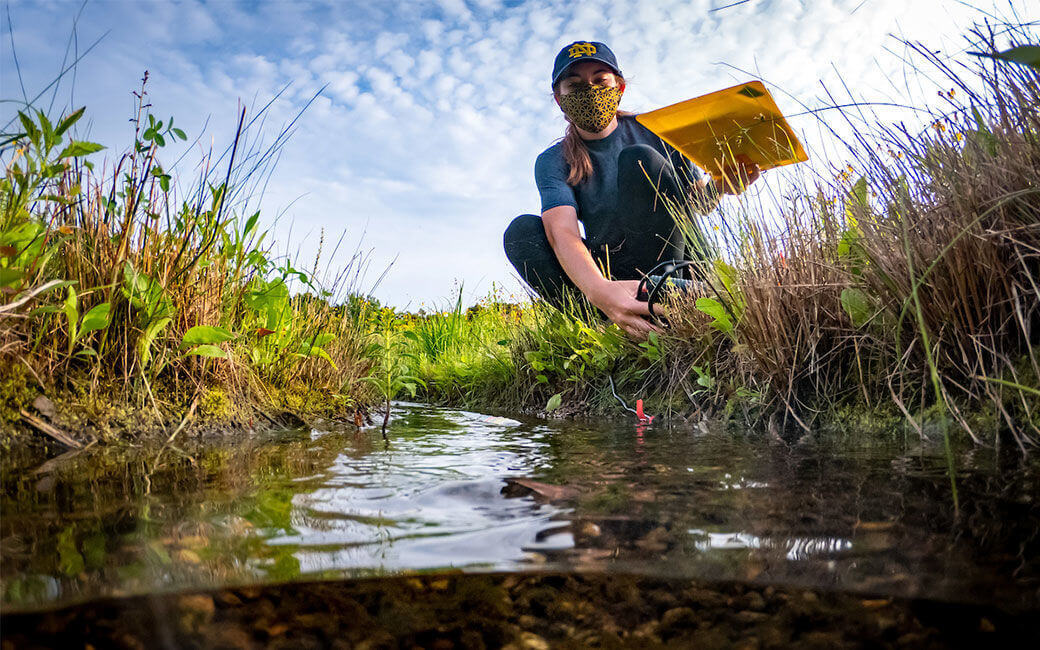
No matter a student's major, minor, or field of interest, Notre Dame's undergraduate-centered educational model allows students to find research opportunities in many departments, centers, and institutes across campus.
Our key research areas lead our efforts while the Flatley Center for Undergraduate Scholarly Engagement supports student engagement, from one-on-one advising to securing funding.
Some students work in labs, some partner with professors for special projects, and many Notre Dame undergrads find themselves traveling throughout the United States and even abroad to conduct research over their breaks. Research isn't just accomplished in a lab here.
Meet six students whose research ranges from studying structural design in Germany to solar panels and green design to understanding correlations between mental illness and aggression.
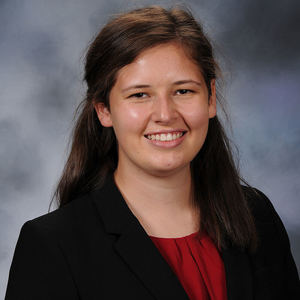
Annalena Belm '21
Major: Civil Engineering
Minors: German, Business Corporate Practice
What I do:
My research internship at the University of Stuttgart with the Institute of Building Structures and Structural Design (ITKE) as a DAAD Research Internships in Science and Engineering (RISE) Germany Scholar was a turning point in my research project.
During this time, I realized how academic research in sustainable and interdisciplinary solutions has the ability to improve the lives of the people that I have met in the many places I have lived.
Under Prof. Jan Knippers, I researched carbon fiber as a sustainable, light-weight replacement for traditional materials, which could dramatically reduce building cost and maintenance. Since the use of the material is still in its early phases, my team’s research was focused almost exclusively on the material’s use in expensive, high-end pavilions. Yet, much to my surprise, only a few engineering centers had even looked into how these carbon fiber materials could be incorporated into ordinary construction. I am working toward finding a use for these innovative materials in the design of sustainable buildings in order to create more affordable and reliable housing for marginalized communities.
How I got started:
I began to be interested in sustainable design during my sophomore year as co-president of SWE [the Society of Women Engineers] Team Tech, when I led a research team in a collaborative project with local homeowners and the University’s Eck Institute for Global Health to develop affordable, do-it-yourself lead-testing methods to mitigate contamination in their homes.
We worked out easily implementable strategies that targeted high-risk areas in the home and presented them to residents. While learning more about the ways to mitigate the dangers of high lead contamination, our team understood the crucial role of active listening to and timely communication with the wide range of stakeholders—from the city government to local homeowners—for the successful completion of this project.
After the presentation of our results at the National Society of Women Engineers’ Team Tech Competition in California in 2019, I had the opportunity to discuss the ramifications of our research for other communities with inspirational women engineers from across the country.
What I've learned:
During my time as a research assistant at the University of Stuttgart and as an intern at Jacobs Engineering, I became convinced that I can use my research and leadership skills to fight for the underserved communities that are frequently overlooked in civil engineering. These communities will need sustainable solutions within the near future. Structural innovations need to be used not only for expensive buildings but also for serving in-need and impoverished communities.
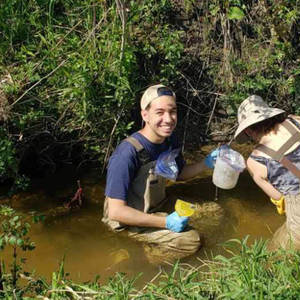
Jacob Fries '21
Majors: Environmental Science, Latino Studies
What I do:
My research is through the Tank Lab in the Department of Biological Sciences. The lab's work focuses on agricultural conservation and the impacts on Indiana watersheds, whether that be through employing new conservation techniques, monitoring of high-frequency sensory data, or experimental benchwork on water and soil samples.
Using the high-frequency data collected by sonde monitors placed in two local watersheds, I am using hysteresis and flushing indices to look at patterns in sediment mobilization due to storm events.
With code in R written by other members of the lab and compiling many Excel files of data, I was able to look at over 40 different storm events over a five-year period. The indices calculated in R, along with the graphical relationships between stream discharge and turbidity (as an indicator of sediments), allow us to look at the efficacy of the agricultural conservation practices that are in place. Notably, there are different amounts of cover crops planted at the two watersheds, so we can use this analysis to further determine if more cover cropping helps prevent drastic sediment fluxes in the streams.
How I got started:
Coming into Notre Dame, I was confident in my choice to be an Environmental Science major. Towards the end of my first year, however, I realized that I wanted to get more hands-on experience in research to expand on my science coursework.
I was in a Biostatistics course that spring, and my graduate TA, Martha Gerig, was a member of the Tank Lab. I had looked on the Biological Sciences website, and when I realized that Martha was involved in one of the labs I was most interested in, I reached out to her. When she told me there was an opening for an undergrad to join the team, I jumped on the opportunity! I began working in the lab fall of my sophomore year, and have been a part of it ever since.
This year, due to COVID-19 and lab restrictions, I shifted my focus to my own research project that I could work on remotely. Although I missed being in the lab in Galvin every week, I am grateful I had the opportunity to still make the most of this year!
What I've learned:
Before being involved in research, I never truly appreciated how collaborative science is. In classes, we often complete assignments and exams on our own, but in the lab environment there is so much communication and collaboration between the PI, grad students, and even undergrads when applicable. I have really enjoyed assisting the graduate students, hearing about their own research projects, and especially attending their dissertation defenses.
Specifically, through the research in the lab, I have learned the importance of connecting science to the local community. The only way the research in the Tank Lab is possible is through its collaboration with local farmers and having access to the watersheds located near their fields. Not only does research like this represent the application of science to the lives of those around us, but also highlights the need to make scientific discoveries accessible and understandable for the general public.
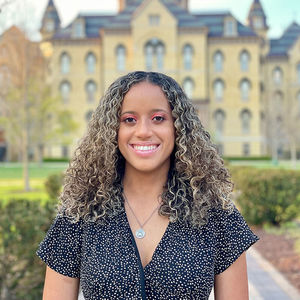
Eliza Smith '23
Majors: Psychology, Peace Studies
Minors: Cybersecurity, Italian
What I do:
I am an undergraduate research assistant of the Center for Advanced Measurement of Personality and Psychopathology. I work in the Forensic and Law Psychology department of our lab under Claire Scott-Bacon, a graduate researcher in our lab. In our section of the lab, we focus on criminality, dark traits, intelligence, aggression, psychopathology, autism, and juror decision-making.
I am currently on a project with another Undergraduate RA and Claire in which we are looking at intelligence, autism, dark traits, and aggression. My independent research project focuses on specific psychopathological disorders like Schizo-affective disorder, Anti-Social disorder, Perfectionism, Depression, and Anxiety and how they correlate with aggression.
I hope to be able to craft this research into a legal discussion about claiming mental illness as the reason for a perpetrator’s actions and how we need to provide better mental care to criminals even if after committing a crime. A subset of this study is to look at how different demographics like gender, sexual orientation, political affiliation, and race play into a person having psychopathologic disorders, aggressive tendencies, and how to better cater towards their mental health needs.
How I got started:
I was inspired to study psychology after one of my good friends was diagnosed with severe depression and suicidal ideation. After I spent time trying to find ways to help her and understand what was happening to her mind, I started thinking about other things that I had trouble understanding.
One of the most impactful memories I reflected on was the murder of my uncle and cousin. I had so much trouble trying to grasp what would lead a person to do such a horrible thing, but then I thought of other criminal activity that is difficult to understand how a person could do this. I thought psychology was a sufficient avenue to explore these reasons. With that being said, when I came to Notre Dame I explored ways to study psychology, law, and different cultures in order to understand people’s minds to a greater extent and understand differences between minds.
In my second semester here at Notre Dame, I took Psychology of Personality with Dr. Watson where he discussed his lab and research at length. I knew I had to join. I applied and within ten minutes of my interview, I met Claire who instantly wanted to help me and work together. I joined the lab in the following weeks, and I threw myself headfirst into all of my intellectual aspirations in order to help the mentally vulnerable and improve our criminal justice system.
What I've learned:
Throughout my time in the lab, I have been able to grow as a researcher. The hard and soft skills I have been able to cultivate like presenting, data analyses, and scale creations have put me in a position to produce proper research that has the potential to improve livelihoods and the legal frontier. It has also put me in a great position to continue my research in graduate school, and then take this research to law school and practice.
The most critical thing I have learned through my research is the complexity of these issues. Stigmas regarding mental illness both in and out of the courtroom are stagnant and need a large group of dedicated individuals who will research these topics to show why it is necessary to talk about mental well-being. Being able to see that there are confounding variables that go beyond just biology that can affect a person’s mind and decision-making, has made me more aware of the importance of a person’s background when considering their psyche.
Lastly, I have learned how necessary it is to have these conversations for the benefit of society as a whole, but especially to help those vulnerable and at-risk to both crime and psychopathology.
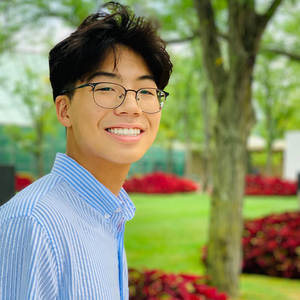
Brian Kang '22
Major: Chemical Engineering
Minor: Energy Studies
What I do:
My research focuses on perovskite, which is a type of structure used as a base for a different type of solar cell (aside from the typical silicon solar cell). Perovskites have been used in order to increase the efficiency of solar cells because it allows for more light in the spectra to be absorbed. The primary issue with this is the stability of the cell and its rapid degradation, which derives from halide mobility. Solutions are explored by testing many different variables in regards to its stability.
This past winter and the upcoming summer, my research is focused on cation migration because this compliments the mobility of the halides and could be tested to see if it helps with the overall stability of perovskite.
How I got started:
I have been always interested in working in the solar energy field and was recommended to reach out to Professor Kamat since my first year. Through the energy studies minor, Anne Pillai recommended that I apply for the Slatt fellowship, which is exactly what I did. I was introduced to upperclassmen who were involved with the specific lab that I desired to work in and also people who had also applied for the Slatt fellowship. I got a great sense of what I was driving towards since then and with the opportunity of the Slatt fellowship, I was able to commit this past winter break to work in his lab.
What I've learned:
I learned that research isn't simply about using your knowledge to apply in a practical setting. It heavily revolves around problem solving. There are many more times when things did not work out the way that I expected, and I learned more to accept these happenings instead of getting too frustrated about it. The way of thinking that I developed during my time in research is definitely one of the most valuable lessons I have learned.
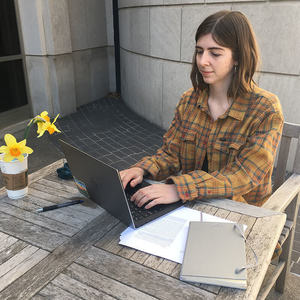
Megan Allen '22
Majors: Business Analytics, Economics
What I do:
I’m a student Research Assistant at the Lab for Economic Opportunity (LEO). At LEO our overarching goal is to use economics research to help end poverty.
We achieve this, primarily, by running research studies called randomized control trials to determine the effectiveness of different anti-poverty programs in the United States. I’ve worked mostly on projects based in King County Washington that were focused on youth and family homelessness and transportation for low income individuals.
Typically my role is to provide support for the various LEO projects. This includes doing everything from writing code in order to clean and analyze data to helping to write research reports and briefs.
How I got started:
The summer after my freshman year of college I went back home to intern for a county government in the Portland Oregon area. I watched as policy was developed, refined, and implemented. In each step of the policy development process there was discussion and analysis but little contemplation of effectiveness.
I couldn’t keep questions like: “Is this the best way we could be helping people? How effective are the initiatives we’re implementing? How could we be helping people more?” out of my mind. LEO’s constant pursuit of answers to these questions is what drew me to the internship program and is what has kept me engaged in all of the projects I have been assigned to. It is inspiring, and motivating, to know that the research I’m doing will help shape, not only effective programs, but effective policy that will contribute to improving individual’s lives for decades.
What I've learned:
Through my research I’ve gained hard skills like coding, writing, and statistical analysis, but the biggest things I’ve learned are how we can shape better and more effective policy and how I can use my skills to help improve people’s lives. I originally decided to attend Notre Dame because in every single pre-college presentation, visit, and educational material there was an emphasis on attending college, not just to gain knowledge or have a higher earning potential, but to serve your community. I’ve grown immensely during my time at ND gaining new skills and abilities, and it has been incredibly rewarding to apply these skills and help improve the communities I live and work in.
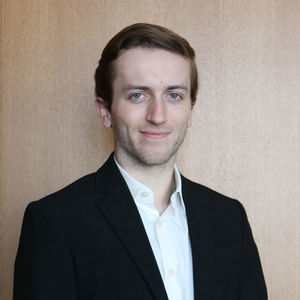
Robert Crawford '23
Major: Architecture
What I do:
The primary goal of my project was to determine the energy savings that could be produced by retrofitting solar panels on the roofs of a group of HUD-owned [Department of Housing and Urban Development] apartment buildings in South Bend.
Roof dimensions and angles were taken from Google Maps and other GIS maps, and particular attention was paid to roof features that would prevent solar panel installation, including chimneys and vents. The position of nearby trees was also marked in order to know which solar panels would be partially in shade.
Annual average energy production was calculated after determining the proper angles, dimensions, solar irradiance, and panel efficiency. The final results of this research showed that the proposed installation would provide more than 85 percent of the energy normally used in the apartments.
How I got started:
My sophomore year of college, I became very interested in sustainability. It is both a personal mindset and a professional practice that is an imperative for creating a habitable world for the future. Within the field of architecture, green building must become the standard of design, as soon as possible.
I joined the sustainability minor during my sophomore year and have since been taking a variety of classes on the topic. A number of papers for these classes were research-based, and I was excited by the prospect of learning more about some of the most important facets of sustainability. During the fall semester of my junior year, I approached Professor John Onyango of the School of Architecture and he helped me devise a research plan focused on solar energy.
What I've learned:
My research introduced me to the basics of solar panel construction and installation, which has been helpful in filling in some of the gaps in my knowledge of green design. It also revealed the difficulty of acquiring relevant data and information on the topic—at many points, finding the proper equation or the correct numbers was nearly impossible. It is going to be incredibly difficult to introduce the technology of solar panels and other renewable energy products into the public realm without better, clearer sources of information.
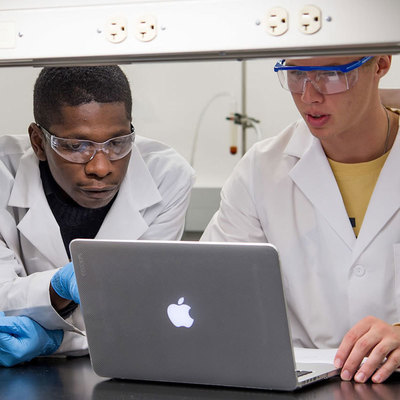
Ready to dig into research opportunities at Notre Dame?
- Check out the Flatley Center for Undergraduate Scholarly Engagement (CUSE) to get started. CUSE also advises students through the application process for prestigious programs, such as Rhodes and Fulbright so they may pursue research and scholarship after graduation.
- Learn about our approach to undergraduate research.
- Each college and school at Notre Dame is home to centers and institutes that facilitate student research. Visit individual college websites to learn more:
Originally published by at admissions.nd.edu on April 14, 2021.